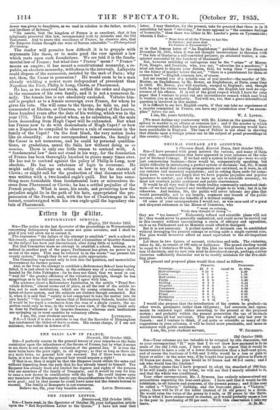THE JERSEY LETTER.
Brentwood, 22d October 1855. SIR—I haveresskin the Spectator of October 20; your indignation article upon the "Red Republican Letter to the Queen." I have not read that Iletter. I may therefore, for the present, take for granted that there is in-it something farmore "revolting," far-more opposed to "the common feelings- of humanity," than there was either in Mr. Landor's poem on Tyrannicide; wherein I find- " Most dear of all the Virtues to her Sire Is Justice; and most dear
To Justice is Tyrannie4de"; .
or in that famous letter of "An Englishman" published by. the Rmes:of December 20, 1851, when it was not thought inconvenient to threaten with "the-fate of Gustavus a self-convicted perjurer, an attainted 'traitor, a con- spirator successful by the butchery of thousands."
But however revolting or outrageous may be the " crime " of Messrs. Pyat, Rougee, and Jourdain, who, you say, "advertise for a murderer." I must ask leave to dispute your dictum, that, for being their "accomplices in the felony of murder before the act," "there is a punishment for them at common law "—English common law, of course.
Let me remind you of a notable case of real murder—the murder of Mr. Morton, an-Englishman, by Mr. Bower, an Englishman, at Paris, some time in 1852. Mr. Bower, you will recollect, escaped to England ; and, though both he and his victim were English subjects, the English law took no cog- nizance of his offence. It is out of the great respect which I have for 3-oue paper that I venture to point out any inconsiderate remark which may tend to weaken you as an authority. You will see, too, that a grave international question is involved in this matter.
It in difficult to see how English courts, if they can take no cognizanevof a murder committed in France, can have any jurisdiction over an accom- plice" before the act., .[We must decline any controversy with Mr. Linton on the qpestion. Con- spiracy to murder is an offence at common law ; and if the murder to which our correspondent alludes had been planned here, that planning would have been punishable in England. The case of Peltier is not alone in showing that attacks upon a foreign prince can be the subject of penal prooeedingain this country.—ED.]


























 Previous page
Previous page